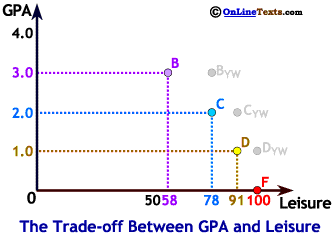

16 Inefficient use of resources in this example would be spacing out in class, so that time devoted to academics isn't useful, or worrying about a test while at a party or at a movie, so that leisure time isn't really enjoyed.
 The time required by our student to earn a 4.0 is significant. She has to give up 58 hours of leisure, or all her remaining free time to improve from a 3.0 to a 4.0. In other words, the opportunity cost of GPA points in terms of leisure time is increasing as GPA increases. A GPA point costs only 9 hours a week when the original GPA is 0, but it costs 58 hours a week when the original GPA is a 3.0.
The time required by our student to earn a 4.0 is significant. She has to give up 58 hours of leisure, or all her remaining free time to improve from a 3.0 to a 4.0. In other words, the opportunity cost of GPA points in terms of leisure time is increasing as GPA increases. A GPA point costs only 9 hours a week when the original GPA is 0, but it costs 58 hours a week when the original GPA is a 3.0.
Opportunity costs that vary in this way are very common and are the reason the typical PPF has the shape shown to the right. When we draw the curve that passes through points A through F the shape is "bowed out," due to changing opportunity costs. Points along the PPF represent GPA-Leisure combinations that are available if our student uses all her time efficiently.16 Points below the PPF represent outcomes that are the result of inefficient or wasted time and resources, while points above the PPF, such as those labeled YW, are not feasible so they are not available to this particular student.
This is the PPF for one particular student. Not everyone requires 100 hours a week to earn a 4.0. On the other hand, we can be fairly certain that for any student the opportunity cost of a GPA points in terms of leisure time is increasing as GPA increases.


16 Inefficient use of resources in this example would be spacing out in class, so that time devoted to academics isn't useful, or worrying about a test while at a party or at a movie, so that leisure time isn't really enjoyed.